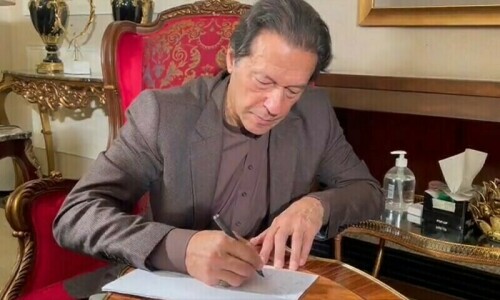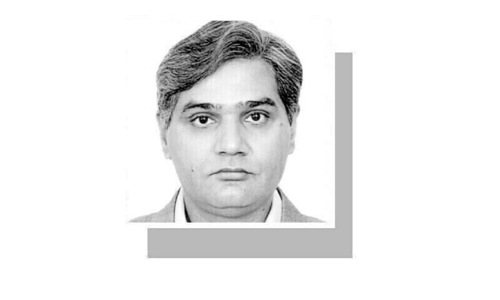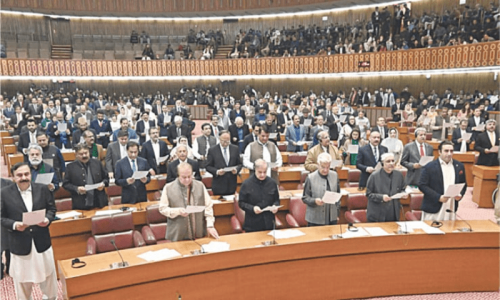ISLAMABAD: Amid rising cases of Covid-19 and after getting reports of continued violations of standard operating procedures (SOPs) and guidelines for prevention of coronavirus by people from almost all parts of the country, the government has now decided to go for a stricter lockdown, but only at places where such violations will be more flagrant.
This was stated by Minister for Information and Broadcasting Shibli Faraz while talking to Dawn after attending a high-level meeting presided over by Prime Minister Imran Khan on Thursday to review the prevailing Covid-19 situation and implementation of the SOPs and guidelines at public places after its last week’s decision to ease about one-and-a-half months’ lockdown across the country.
During the past 24 hours, 30 people died from coronavirus, taking the overall death toll to 791. In the last one day, the total number of confirmed cases increased from 35,384 to 36,788, with 758 new cases reported from Sindh, 333 from Punjab, 63 from Islamabad, 198 from Khyber Pakhtunkhwa, 71 from Balochistan, seven from Gilgit-Baltistan and three from Azad Jammu and Kashmir.
The absence of Sindh Chief Minister Murad Ali Shah and Balochistan Chief Minister Jam Kamal Khan Alyani from the meeting was conspicuous. An official handout issued by the Prime Minister Office said the meeting was attended by Punjab Chief Minister Usman Buzdar and KP Chief Minister Mehmood Khan through video links, besides Planning and Development Minister Asad Umar, Minister for Economic Affairs Hammad Azhar, Shibli Faraz, National Food Security Minister Fakhar Imam, Adviser to the PM on Finance Abdul Hafeez Shaikh, Special Assistant to the PM (SAPM) on Health Dr Zafar Mirza, SAPM on Information retired Lt Gen Asim Bajwa, SAPM on Commerce Razaq Dawood, National Security Adviser Moeed Yousuf, PM’s Focal Person on Covid-19 Dr Faisal and National Disaster Management Authority Chairman Lt Gen Mohammad Afzal.
Chief ministers of Sindh and Balochistan absent from meeting chaired by PM; 30 deaths and over 1,400 cases reported in a single day
“We are giving a margin to the people because markets and places have been opened after a long time,” Shibli Faraz said, admitting that they had got reports that people and shopkeepers in many areas were not following the government’s SOPs and guidelines.
“We are closely monitoring the situation. We will be taking decisions very shortly as to which areas have to be [completely] closed,” he said, adding that in the areas where the people, by and large, would be taking precautionary steps, the present arrangement would continue.
The information minister said the Punjab government had already closed some shopping centres and markets in Lahore after getting reports about violations of the SOPs which included social distancing and wearing of face masks.
Terming it a “tricky matter”, he ruled out the option of imposing fines or punishing the people over violations of SOPs and said it would be unfair with the poor people, particularly daily wage earners.
Responding to a question about the absence of the two chief ministers, Mr Faraz said it was not a formal meeting of the National Coordination Committee and the Punjab and KP chief ministers had been invited to discuss some issues related to their respective provinces.
According to the official announcement, Prime Minister Khan told the participants of the meeting that imposing lockdown was not a solution to coronavirus, rather a temporary step, and the government would take decisions according to the ground realities and the condition of people.
The prime minister said the lockdown had a negative effect on the routine life of the people. However, he added, due to the unprecedented situation the government was maintaining a balance between hunger and lockdown by adopting various precautionary measures to prevent the spread of coronavirus. He reiterated his stance that hunger was more dangerous for the people than the lockdown.
In the present situation, Mr Khan said, if the economy was not revived the problems of the poor and downtrodden segments of society would increase. He said the government was cognisant of the losses the country’s economy had suffered due to the closure of businesses, but it had to take that step under compulsion.
He said coronavirus was a reality and the government would implement the guidelines about precautionary measures and save people’s lives. He said that instead of forcing the people to adopt precautionary measures, there was a need to create awareness among them. He directed police to adopt a friendly attitude instead of coercive measures.
The prime minister appreciated the media for creating public awareness about the pandemic and said the media should further pursue the people in a more effective way about adopting precautionary measures and implementing the coronavirus-related guidelines.
The chief ministers of Punjab and KP informed the meeting about the difficulties being faced by the common people due to the closure of transport, which had badly affected their business and movement.
The prime minister reiterated that the government’s policy about the lockdown was very clear and said that instead of putting the lives of people into unnecessary danger, the government would facilitate people and small traders.
Demands by the automobile sector, particularly motorcycle manufacturers, and the Shopping Malls Association, were also presented to the prime minister. Mr Khan directed the minister for industries to review the demands so that a decision could be taken in this regard.
Dr Zafar Mirza briefed the meeting on the Covid-19 situation and the number of affected people, confirmed cases, its geographical spread, number of tests conducted and the ratio of increase in coronavirus cases.
The meeting deliberated upon various matters regarding the future number of Covid-19 cases and availability of beds in hospitals in the changing situation, provision of medical equipment and ensuring availability of professional staff. The meeting also reviewed various steps about health facilities and increase in capacity of hospitals.
Talking to Dawn, Minister for Planning Asad Umar said they were taking steps to ensure implementation of the guidelines by the people and shopkeepers.
When asked about the steps being taken to ensure the implementation of SOPs, he said in some cases the provinces had even registered FIRs (first information reports), whereas in many places police and the administration had engaged people and shopkeepers by telling them about the dangers they could face in case they violated the SOPs.
The minister said the government did not want to use batons and put people behind bars, adding that they wanted to convey it to the people and shopkeepers that they needed to change their behaviours as it was for their benefit too.
Replying to a question, he said decisions about Eid days would be taken in the next couple of days.
Earlier, Mr Umar presided over a meeting of the National Command and Operations Centre, which took an in-depth analysis of the existing beds, ventilators and other facilities in hospitals keeping in view the possible spread of Covid-19 and the present available data. The purpose of the thorough examination of the existing facilities was to collect real-time data and gauge capacity of the hospitals.
Addressing the meeting, the planning minister said the provinces and hospital managements had the responsibility to ensure verified data of the virus-affected patients to take effective measures for mitigating the risk of the pandemic outbreak. He said the provinces and hospital managements had an important role to play in providing credible information and they were doing an excellent job in this context and it should continue.
Published in Dawn, May 15th, 2020

















































